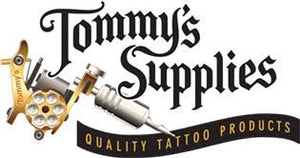Sterilization 101: Keeping Your Tattoo Studio Safe and Compliant
TL;DR:
Sterilization in tattoo studios is non-negotiable. Artists must use autoclaves, single-use needles, and hospital-grade disinfectants to prevent infection and stay compliant with health codes. Regular surface sanitation, barrier protection, and strict waste disposal keep both clients and artists safe. Cutting corners risks health, lawsuits, and your license.
Tattooing is a medical-grade procedure—it breaks the skin and introduces foreign pigments. Without sterilization:
- Clients risk infections, hepatitis, and bloodborne pathogens.
- Studios risk license loss, lawsuits, and reputation damage.
- Artists risk their own health through cross-contamination.
Sterilization is both a safety practice and a legal requirement under state/local tattoo regulations.
1. Single-Use Supplies
- Needles & Cartridges: Must be pre-sterilized, single-use, and discarded in sharps containers.
- Gloves & Razors: Nitrile gloves for each client; razors disposed after one use.
- Ink Caps: Single-use only—never dip bottles directly into caps.
Why it matters: Reusing disposables = highest risk for cross-contamination.
- What it is: Medical-grade steam sterilizer (121–134°C) that kills all microbes, spores, and viruses.
- Use cases: Metal grips, stainless steel tubes, forceps.
- Best practice: Weekly spore testing (biological indicator test) to prove sterilization efficacy.
Why it matters: Wiping with alcohol is not sterilization. Only autoclaves guarantee microbial kill.
- EPA-registered hospital-grade disinfectants: Madacide, Cavicide, or similar.
- Routine: Clean chairs, armrests, machines, and workstations before and after each client.
- Barrier films: Use disposable wraps on tattoo machines, clip cords, spray bottles, and light handles.
Why it matters: Viruses like HBV can survive on surfaces for up to a week if not disinfected.
- Wash hands 20+ seconds before and after each procedure.
- Use fresh gloves, aprons, or protective sleeves for each client.
- Never touch clean and contaminated surfaces with the same gloves.
Why it matters: Hands and gloves are the #1 vector for cross-contamination.
- Sharps disposal: FDA-approved sharps containers for needles.
- Contaminated waste: Red biohazard bags for blood-soaked materials.
- Regular pickup: Partner with licensed medical waste disposal companies.
Why it matters: Improper disposal can cause accidental injuries and health code violations.
- Health departments may require:
- Autoclave spore test logs
- Studio sanitation checklists
- Proof of bloodborne pathogen training
- Regular inspections are standard in most U.S. states.
Why it matters: Compliance isn’t optional—it’s the law.
- Reusing ink caps or gloves → introduces bloodborne pathogens.
- Skipping autoclave testing → equipment may not be fully sterile.
- Improper surface wipes → household cleaners aren’t strong enough.
- Touching phones or doors with gloved hands → spreads contaminants outside work area.
Q: Is alcohol enough to sterilize tattoo equipment?
A: No. Alcohol disinfects but does not sterilize. Autoclaves are required for reusable tools.
Q: How often should an autoclave be tested?
A: Weekly spore testing is the industry standard for compliance.
Q: Do all tattoo artists use autoclaves?
A: Many now use single-use cartridges, reducing autoclave needs. But shops with reusable grips or tools must maintain one.
Q: Can I tattoo at home without sterilization equipment?
A: No. It’s unsafe, often illegal, and risks serious infection.
Q: Who sets tattoo sterilization regulations?
A: Local health departments. Rules vary by state/country, but bloodborne pathogen standards apply universally.
Sterilization isn’t just about passing inspections—it’s the foundation of a professional tattoo studio. From single-use needles to autoclave testing and surface sanitation, every step protects your clients, your reputation, and your license. Cutting corners in sterilization isn’t just unprofessional—it’s dangerous.










